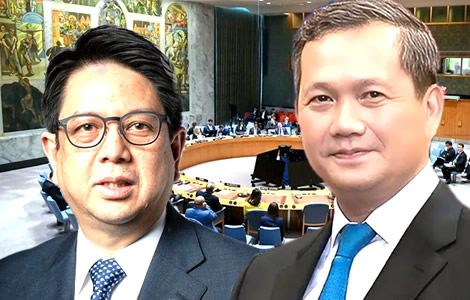UN Security Council holds closed-door emergency meeting on Thai-Cambodian conflict sparked by deadly border clash. Thailand condemns Cambodia’s false claims, demands an investigation into illegal mine-laying and warns of escalating tensions amid calls for a ceasefire and peace talks.
Later on Friday, the United Nations Security Council will meet behind closed doors to tackle the Thai-Cambodian conflict that erupted on Thursday. Yet, Bangkok is wary. Phnom Penh not only triggered the meeting but is pushing false narratives that wrongfully blame Thailand for the violence. Thailand’s Permanent Mission in New York has fired off letters to key UN figures, setting the record straight. Still, Bangkok knows it must pay close attention—especially to China’s position. The Council will almost certainly demand a halt to the fighting and call for talks. But the false claims from Phnom Penh are rattling Thai officials, fueling deep mistrust.

The United Nations Security Council (UNSC) is holding a high-stakes emergency meeting today to address the worsening conflict between Thailand and Cambodia. The session, which was requested by Cambodian Prime Minister Hun Manet, follows a deadly clash along the Thai-Cambodian border that has inflamed regional tensions and drawn international concern.
According to Thai officials, Cambodian forces opened fire without warning on July 24 in Sisaket province, a border region in northeastern Thailand. The exchange of gunfire killed 13 Thai civilians and one soldier.
Cambodia pursues dual diplomatic and military strategy amid escalating border conflict with Thailand
Although Cambodia acknowledged the confrontation, it has not confirmed any casualties on its side. As such, the attack, described by Thai authorities as “blatant and unprovoked,” has sparked immediate diplomatic fallout.
While Cambodian Prime Minister Hun Manet focused on rallying international support through the United Nations, his father and predecessor, Hun Sen, oversaw military operations on the ground. Together, this coordinated effort underlines the dual-track strategy Cambodia appears to be pursuing — combining diplomacy with aggressive military posturing.
The emergency UNSC meeting is being held in a closed-door format in New York at 3:00 p.m. local time (2:00 a.m. on July 26 in Thailand). Only the 15 member states of the Security Council, along with the permanent representatives of Thailand and Cambodia, will be allowed to speak. Each delegation is expected to present a brief but pointed statement regarding the conflict.
Thailand’s representative, Ambassador Cherdchai Chaiwaiwit, will present the country’s case to the Council. He is expected to challenge what Thai officials call “disinformation and false narratives” coming from Cambodia. Thai authorities maintain that Cambodian troops fired first and deliberately targeted civilians in Thai territory.
Thailand acts swiftly with official letters to UN leaders to counter Cambodia’s claims and inform the world
In the lead-up to the meeting, Thailand moved quickly to assert its position. On July 24, Ambassador Cherdchai sent three urgent letters to top United Nations officials. First, he wrote to Mr. Asim Iftikhar Ahmad, Pakistan’s Ambassador to the UN and the current UNSC President. The letter presented Thailand’s version of events and directly countered Hun Manet’s claims.
In addition, a second letter was circulated to all permanent representatives of UN member states. This document aimed to ensure that the broader international community received Thailand’s account of the border violence.
Furthermore, a third letter was addressed to UN Secretary-General António Guterres. In it, Thailand reported Cambodia’s alleged violation of the Ottawa Convention, an international treaty banning anti-personnel landmines.
The Thai government claims that two of its soldiers were maimed by newly planted landmines on July 16 and July 23. According to officials, the mines were laid after the first incident and in an area already cleared.
Thailand demands investigation into Cambodia’s illegal mine laying and condemns escalating aggression
Thailand argues that this indicates a deliberate attempt to injure Thai personnel, in breach of international law. Therefore, the Thai delegation has requested a formal investigation into Cambodia’s mine-laying activities under the Convention’s provisions.
Moreover, the growing crisis has prompted strong responses from Thai leadership. Deputy Prime Minister Phumtham Wechayachai condemned Cambodia’s use of force, accusing its military of indiscriminate shooting. He stressed that Thailand had authorised its military to take “all necessary measures” to defend national sovereignty. Consequently, the situation has placed Thai armed forces on heightened alert.
At the same time, Foreign Minister Maris Sangiampongsa briefed foreign diplomats and confirmed that an evacuation plan is being prepared for Thai nationals living in Cambodia.
Thailand, he said, would act within international law but would not tolerate violations of its territory or harm to its citizens. Meanwhile, efforts are being made to keep regional diplomatic channels open.
Mounting pressure calls for international action against Cambodia amid urgent UN Security Council session
Political pressure is also mounting at home. The ruling People’s Party released a statement condemning Cambodia’s attacks on civilians. The party called the actions a violation of international law and an affront to Thai sovereignty.
It urged the international community to hold Cambodia accountable. Additionally, members of parliament have called for more international engagement to prevent further escalation.
Although today’s UNSC session is expected to last only 15 minutes, its importance is not in doubt. It marks the first formal international airing of the current crisis and could set the tone for further action. Thailand hopes the meeting will clarify the positions of key global powers and rally support for its call for accountability.
Cambodia’s Hun Sen’s hidden agenda for unprovoked, deadly and destructive actions may involve China
Hot War rages on the Thai Cambodian border with Cambodian troops on the offensive in Chong Bok area
While no resolution is expected from this emergency meeting, the stakes remain high. The conflict, if left unchecked, could destabilise the region. Thus, Thai officials are hoping that swift diplomatic engagement — alongside clear evidence — will shift momentum in their favour.
As the UNSC convenes, all eyes are on the outcome. Whether it eases tensions or deepens divisions remains to be seen. However, both sides appear committed to defending their positions on the global stage — diplomatically, politically and militarily.
Join the Thai News forum, follow Thai Examiner on Facebook here
Receive all our stories as they come out on Telegram here
Follow Thai Examiner here
Further reading:
Hot War rages on the Thai Cambodian border with Cambodian troops on the offensive in Chong Bok area
14 killed and over 100,000 evacuated as army brings in more guns trained on Cambodian border forces
Military blasts Cambodia for breaching international law by planting mines which injured 3 soldiers
Dangerous impasse between Thailand and Cambodia as PM rules out International Court of Justice (ICJ)
Hun Manet confirms Cambodia ultimately may decide to send border dispute with Thailand to the Hague
Khmer soldier killed in deadly gunfire between Thai and Cambodian armies near Ubon Ratchathani


















